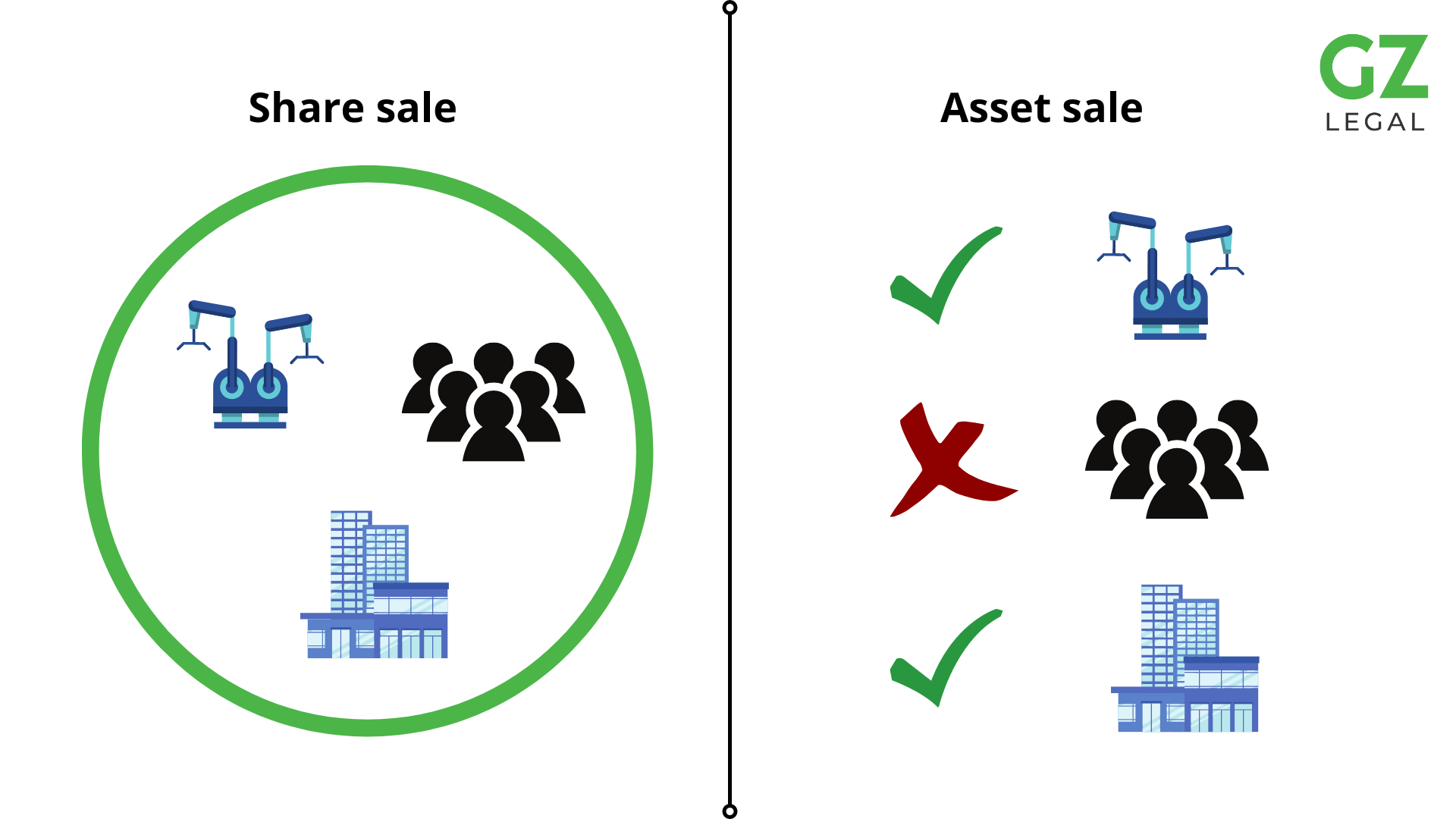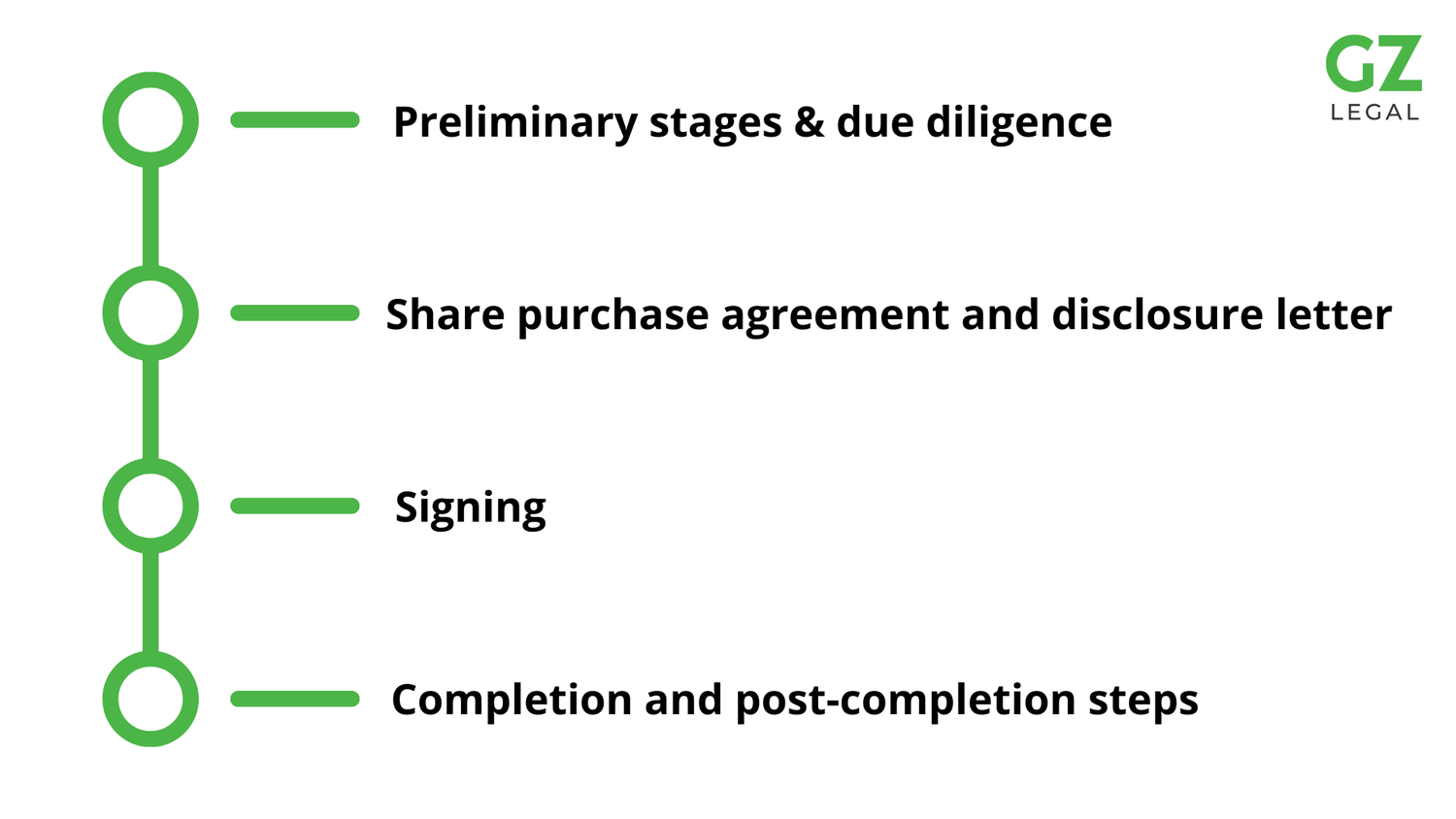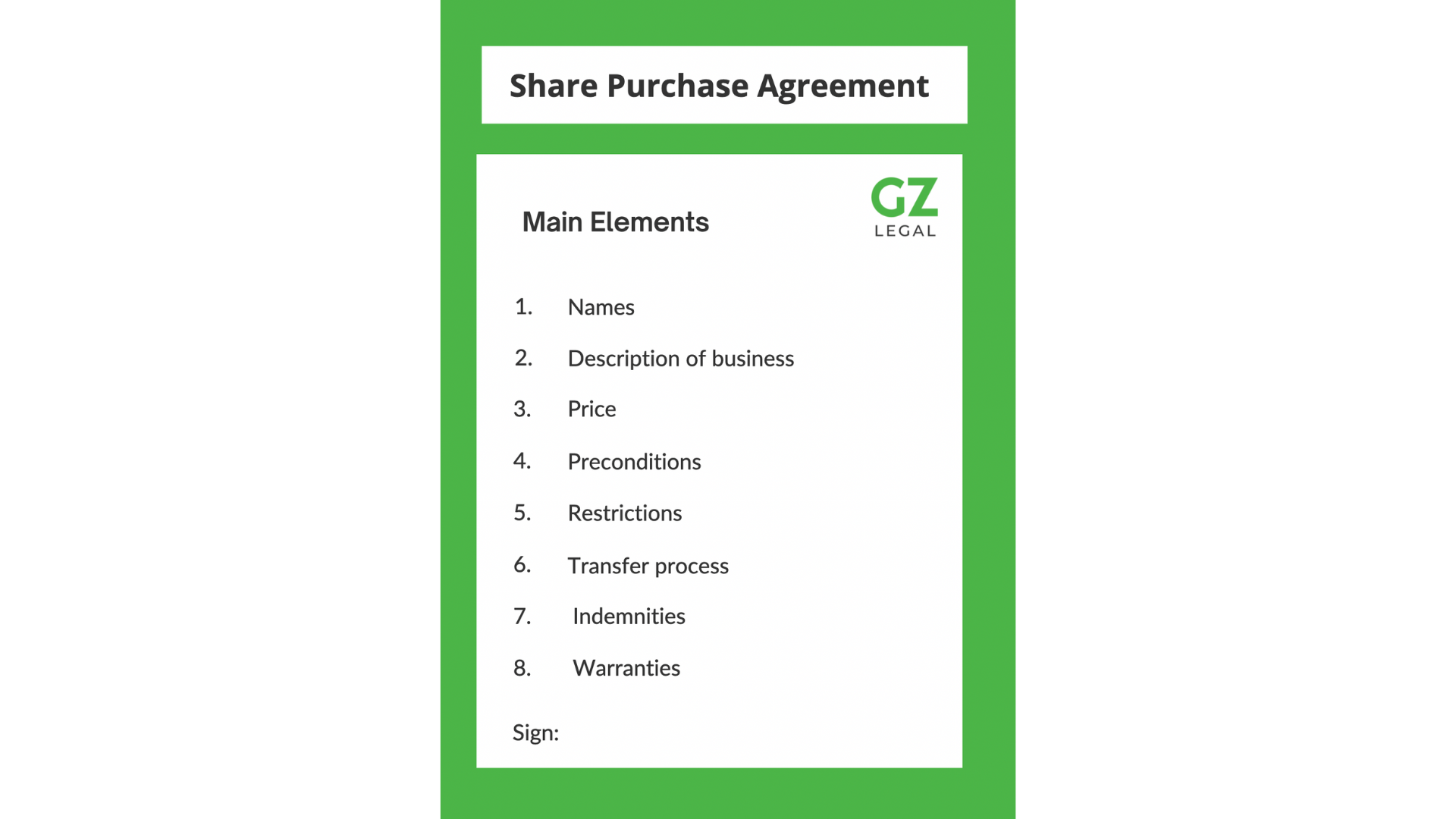Malcolm ZoppiSun Oct 15 2023
UK Business Acquisitions Lawyer: Acquisitions Broken Down for SMEs
What Are The Different Milestones of An Acquisition And How Can These Mitigate Risk?
If you or your company is considering acquiring another private company in the United Kingdom, it is important to seek legal advice from a UK business acquisitions lawyer.
The lawyer will be able to assess the legal risks involved in the acquisition and provide advice on how to minimise these risks. Also known as mergers and acquisitions lawyers, their role is to help with ensuring that the procedural steps are followed to maximise the chances of a successful transaction.
Many legal documents need to be drafted and commercial lawyers will be best suited to offer these legal services to individual and corporate clients looking to acquire a business.
Asset Sale vs Share Purchase
When acquiring a limited company in the UK, there are two main options: asset sales and share sales. Here we will look at the key differences between the two.

What are asset sales
With an asset sale, the buyer acquires the target company’s assets, but not the shares. This means that the buyer gets to pick and choose which assets to buy from the target company. The drawback of this is that it can be harder to negotiate a lower price for the assets, as the seller would be left with unwanted assets which may not be able to generate revenue on their own. Additionally, it can also be more complicated from a legal standpoint, as each asset needs to be transferred separately.
What are share sales
In a share purchase, the buyer acquires a majority stake or all of the target company’s shares via a share purchase agreement. This means that the buyer buys the intellectual property and commercial property (among other assets) but also takes on all of the target business’ liabilities. The advantage of this is that it is simpler and, often, cheaper from a legal standpoint, as only one transaction needs to be made. However, it can be more difficult to negotiate a lower price, as the seller retains no liability.
Scope of the blog
This blog will focus on share sales (private company acquisitions) and how corporate lawyers and their corporate team’s legal assistance can help and provide advice on the diverse range of procedural steps to be taken when private individuals or corporate clients are looking to buy businesses.
This blog will not focus on the following: mergers and acquisitions often involve equity investments by financial institutions and institutional investors (such as large private equity firms) who, for example, use corporate finance and management buy outs as vehicles to grow their portfolio via the acquisition of public and private companies. This is outside the scope of our blog and we will instead focus on what our clients are usually interested in: private transactions by private individuals and smaller corporate clients and how law firms and their legal specialists can offer tax efficient legal help.
We will leave institutional investors and financial institutions looking to buy listed businesses to those charging £700+ per hour.
What is the process of acquiring a business in the UK via a share sale?

Step 1: Preliminary stages & due diligence
What are the preliminary stages in the acquisition of a UK business?
Sellers frequently demand that buyer sign a non-disclosure agreement, which states that the buyer will keep secret all information about the target business that it learns throughout the due diligence process. It is also typical for a deal’s key terms to be outlined in non-binding heads of terms. Heads of terms or separate agreements may include provisions regarding exclusivity and break fees (what happens if someone backs out of the deal).
What is legal due diligence in the acquisition of a UK business?
Due diligence is a process through which a corporate team can assess the risks involved in an acquisition. This includes looking at the financial and legal risks associated with the target company.
The legal due diligence process will involve reviewing the target company’s contracts, shareholders’ agreements, articles of association and any other relevant documentation. The team will also enquire about any litigation that the target company is currently involved in.
The buyer’s corporate lawyers will typically send a lengthy questionnaire to the seller. The buyer’s lawyers will then generally produce a legal due diligence report for the buyer, highlighting any potential legal issues. The buyer will be particularly concerned with factors that have an impact on the target firm’s value, such as a substantial prospective pension, employment law issues or environmental obligations.
Step 2: The share purchase agreement & disclosure letter
What is a share purchase agreement
A share purchase agreement is a contract between a buyer and a seller of a business (via its shares) that sets out the terms and conditions of a share sale. The agreement will typically cover things like the price of the shares, the date of the sale, any special conditions attached to the sale, and the transfer process.
Why do you need a share purchase agreement?
Having a share purchase agreement in place ensures that both the buyer and the seller of the business are clear on the terms of the sale, and provides protection in case anything goes wrong. For example, if the buyer of the business doesn’t pay for the shares as agreed, or if there are problems with the transfer process, the agreement can be used to resolve the issue.
What should you include in a share purchase agreement
There are a few key things that should be included in a share purchase agreement:
– the names and contact details of the buyer and the seller;
– a description of the business being sold;- the price of the shares;
– any restrictions attached to the sale, such as a non-compete clause;
– the transfer process (including how any payment will be made and any procedures regarding intellectual property);
– an indemnity clause (which protects the seller from any liability arising from the sale);
– a warranties and disclaimers section (which sets out what each party is responsible for); and
– signature lines for both the buyer and the seller.
It’s also worth including a clause that allows either party to cancel the agreement if certain conditions are not met, such as if the buyer is unable to obtain financing.

Role of a UK business acquisitions lawyer regarding share purchase agreements
The role of the UK business acquisitions lawyer is to protect the interests of the client and to ensure that the terms of the SPA are favorable to the client.
The acquisitions lawyer will review or draft the SPA to make sure that it includes all of the necessary provisions to protect the client. For example, the commercial lawyer will check to see that the SPA includes a clause specifying that all of the business’ assets are being transferred to the buyer.
In addition, the acquisitions lawyer will negotiate with the other party’s commercial lawyer to try to get the best possible terms for the client. For example, the lawyer may try to get a clause included in the SPA specifying the company’s liabilities and how the total price is to be calculated.
What is a disclosure letter in a business acquisition?
Usually, when you buy a business via shares, the share purchase agreement will have several warranties from the seller about the target company and its business. If this is the case, the seller will usually prepare a disclosure letter that tries to limit the scope of the warranties. This disclosure letter is very important and will usually be heavily negotiated by the parties involved.
Step 3: Signing
In many cases, the signing of the share purchase agreement and the conclusion of the deal will take place at the same time. However, in some situations, there may be an interval between signing and completion for conditions to be met or for third-party consents to be obtained.
Where the buyer and seller are corporate entities, their respective board of directors should hold board meetings to approve the terms of the acquisition and the execution of the transaction documents before the share purchase agreement is signed. Here, it is important that the company, if that is what is desired, is left unchanged (meaning no substantial changes are made due to the sale).
Step 4: Completion and post-completion steps
When the buyer buys shares in a company, the shares will be transferred to their name. The buyer will also have to pay the purchase price for the shares according to the terms of the SPA.
The share purchase agreement will generally describe the documentation that must be provided to the buyer at completion. The transaction’s structure and the agreed method of discharging the purchase price will largely determine the required completion documents. However, in most situations, shares certificates (or an indemnity for lost share certificates), director resignations, secretary resignations, and auditors’ resignation letters will usually be included as part of the completion documentation.
At completion, the target firm (and any related entities) convenes a board meeting to approve those matters that are required to pass control of the company over to the buyer. A corporate buyer or seller may need to hold another board meeting after closing in order to ratify completion and sign any documents provided by that party at completion.
After a share purchase is completed, the buyer must take care of a variety of post-closing issues. Although these things will differ depending on the transaction’s structure, they may include announcing the deal, paying stamp duty on the purchase price for the shares, making any necessary filings, and dealing with several other administrative concerns.
What are the benefits of hiring a UK business acquisitions lawyer?
Complex transaction
Acquisitions are lengthy, complex transactions. Receiving advice on a full range of issues is crucial. Whether you are looking to acquire established businesses, listed companies or thriving start ups, law firms and their legal experts should always be consulted for advice.
Hiring experienced lawyers helps minimise the risks of a business acquisition and increases the chances of a successful outcome using pragmatic advice and working closely with your full service law firm.
A UK business acquisitions lawyer and the law firm’s corporate team can help your company assess these risks by conducting due diligence on the target business. This can also help in avoiding the need for dispute resolution services, as any issues should be addressed before the share sale is finalised.
A UK business acquisitions lawyer can help assess the legal risks involved in an acquisition
There is a broad range of risks involved in an acquisition, including financial, legal, and operational risks. Mergers and acquisitions lawyers will help assess legal risks that can include:
- the potential risk for the acquisition to breach competition law;
- the target business to be a party to unfavorable contracts with third parties;
- opposition from the board of directors or of other shareholders;
- pre-emption or ‘right of first refusal rights;
- opposition from management teams;
- issues arising from the ‘change of control’ (the business being sold) and how it affects the contracts to which the target company is a party to; and
- risks regarding the possibility of gaining the necessary approvals, whether statutory or regulatory, to proceed with the purchase of the business.
Why is it important to hire a UK business acquisition lawyer?
We will now go into more detail about the possible risks involved with the acquisition of a business.
The acquisition breaches competition law
Merger control concerns must always be considered at the outset of a transaction. If they are not addressed in time, the parties may be taken by surprise when they are required to make merger control notifications. The presence of serious competition concerns might influence a buyer’s decision to proceed with the acquisition of a business. It is possible, for example, that the acquisition is not approved by the relevant merger control regulatory body. A corporate lawyer will be able to provide advice on whether this may pose a problem.
The target business to be a party to unfavorable contracts with third parties
Bad contracts can come in many different forms. They may be one-sided, unfair, or just downright unenforceable. Whatever the case may be, these types of contracts can pose a serious threat to your business.
One of the biggest problems with bad contracts is that they can tie you into agreements that are unfavorable to your company. This can limit your ability to negotiate better terms or get out of the contract entirely. It can also put you at a disadvantage when competing against other businesses that are not bound by such restrictive agreements.
Another issue with bad contracts is that they can be very expensive to get out of. If you’re stuck in a contract that you can’t escape from, you may have to pay hefty termination fees or even buy out the entire contract just to be free of it. This can put a serious strain on your finances.
There is opposition from the board of directors or from other shareholders
Several potential problems can arise when a company tries to acquire a business without the approval of the board of directors. First, the acquisition may be delayed or blocked entirely if the board decides to veto it. This can lead to lost opportunities and wasted time and resources.
Second, shareholders may be opposed to the acquisition if they believe it is not in the best interests of the company. This can lead to tension and conflict within the company. Finally, it can lead to financial losses. Valuable legal advice from a dedicated firm will ensure that their clients are aware of the potential issue and how to solve it.

There are pre-emption (right of first refusal) rights
Pre-emption rights can be problematic when a non-shareholder wants to buy a business’ shares because the existing shareholder has the right of first refusal. The right of first refusal means that the existing shareholder has the right to buy the shares before anyone else. This can make it difficult for a new shareholder to come in and can make it hard to value the business.
There are also anti-dilution provisions. These are designed to protect shareholders from having their ownership stake diluted if the company issues new shares. These provisions can make it hard for a business to raise money by selling new shares. Both of these types of provisions can make it hard for a business to be sold. Advice should be sought on how to avoid this.
There is opposition from management teams
One of the key issues that can arise from having opposition from management teams during a business acquisition is the potential for disruptions to the business operations. This is because the main managers may be resistant to change, and may therefore try to sabotage any new initiatives that are implemented by the acquiring company. In addition, senior employees may also attempt to poach key employees from the acquired company to hinder its success. As such, it is crucial for businesses to carefully consider how they will deal with internal opposition before embarking on an acquisition. Seeking advice on how to smoothly change the control of the business’ shareholding whilst keeping the management team happy is crucial to retaining the value of the business.
There are issues arising from the ‘change of control’ (the business being sold) and how it affects the contracts to which the target company is a party to
When a company is sold, the change of control can trigger clauses in contracts that the target company has with third parties. These clauses may give the third parties the right to end the contract with the target company, which can devalue the business.
Lawyers and their corporate teamcan help by reviewing these clauses and advising on the best way to protect the value of the business.
There are risks regarding the possibility of gaining the necessary approvals, whether statutory or regulatory, to proceed with the purchase of the business
One of the key risks in any business acquisition is the need to gain approval from the relevant authorities. This can often be a lengthy and complicated process, which can lead to significant delays in the completion of the sale.
This risk must be carefully considered when assessing any potential business acquisition. A lawyer can help by advising on the likely approval process and timeline, as well as any potential risks or problems that could arise.
If you are thinking of buying a business, it is essential to seek professional advice to ensure that the process goes as smoothly as possible.
“Precaution is better than cure”
— Johann Wolfgang von Goethe
Conclusion
Acquiring a business in the UK via a share sale can be a complicated and time-consuming process. There are several risks and potential problems that can arise, which is why it is essential to seek professional advice from a UK business acquisitions lawyer. A UK business acquisition lawyer can help to ensure that the process of acquiring a business goes as smoothly as possible. They can advise on the likely approval process and timeline, as well as any potential risks or problems that could arise. This helps to protect the value of the business and minimise any disruptions to business operations. Some of the risks that lawyers can advise on include the need to gain approval from the relevant authorities, clauses in contracts that could be triggered by a change of control, and opposition from management teams. Seeking legal advice is essential to minimising these risks and ensuring a smooth process.
Contact us
For further information or a free, initial consultation please do not hesitate to contact our firm. Our lawyers work closely with our clients and use team work to combine our related expertise in providing advice on a range of corporate matters. Via our digital presence and collaborative approach, we are a national law firm and operate throughout England, including all the major cities. Our lawyers have considerable experience in contract-based work, providing advice on a range of practice areas via our multi disciplinary approach to ensure your business ventures are protected and successful. Our nearest office is one call away.
Find out more!
If you want to read more in this subject area, you might find some of our other blogs interesting:
- Step-by-Step Guide on How to Transfer Shares to a Holding Company
- Breach of Settlement Agreement: Consequences and Remedies Explained
- Who Gets the Money When a Company is Sold?
- What is a Counter Offer in Contract Law? Explained Simply and Clearly
- Understanding the Costs: How Much Do Injunctions Cost in the UK?